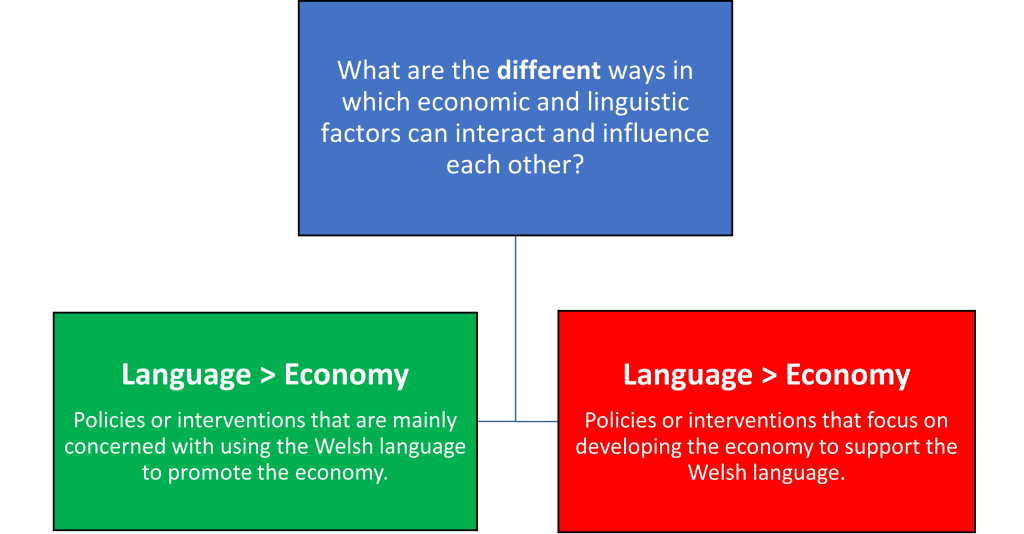In order to achieve ARFOR’s objective of establishing a ‘better understanding of the relationship between the economy and the language’ it is necessary to define more clearly and more concretely what are the different ways in which economic and linguistic factors can interact and influence each other
The ARFOR Programme brings together the local authorities of Gwynedd, Môn, Ceredigion and Carmarthenshire to develop plans that aim to promote economic development across the western counties of Wales, thereby boosting the prospects of the Welsh language. It was established in 2019, following an initial investment of £2 million by the Welsh Government. In October 2022 it was confirmed the Government intended to provide a further £11 million in order to fund ARFOR’s second phase that will run until March 2025.
Following confirmation that the programme will continue, work over the past few months has included reviewing ARFOR’s strategic aims, drafting a new action plan and publishing the prospectus, ARFOR: Creu Gwaith-Cefnogi’r Iaith. Significantly, when looking through this material, one theme that is emphasised time after time is that there is a need to develop a better understanding of the nature of the relationship between the economy and the Welsh language when implementing the second phase of the programme.
For example, the prospectus states that one of the main lessons from ARFOR 1 was that ‘the relationship between the economy and the language needs to be better understood’ (p.5). The action plan reinforces this by stating that ARFOR’s second phase needs to ‘guarantee that it is possible to learn more about the correlation between the economy and the Welsh language’ (p. 9). Furthermore, when introducing the rationale for ARFOR’s Challenge Fund, it is recognised that a ‘lack of knowledge and understanding of the relationship between the economy and the Welsh language’ was ‘a key conclusion from ARFOR’s first phase evaluation’ (p. 19).
An essential first step in order to establish this type of understanding is to try to define more concretely what are the different ways in which economic and linguistic factors can interact and influence each other. Addressing this is key, as it will allow us to see more clearly the different themes or questions that tend to be combined under a general heading such as ‘the relationship between economy and language.’ It is also likely to support the interventions and initiatives that will be introduced by ARFOR 2, for example by ensuring clarity about the nature of projects, and by strengthening efforts to assess the suitability of their rationales or what kind of results are likely to come from them.
When discussing the situation of minority languages such as Welsh, a range of prominent researchers have emphasised the significance of the relationship between the economy and the maintenance of minority languages. For example. For Lenore Grenoble and Lindsay Whaley (1998: 125), ‘[economics] may be the single strongest force influencing the fate of endangered languages.’ Wayne Harbert (2011: 404) concurs by claiming that economic factors are ‘the fundamental shapers of the fortunes of endangered languages.’ Colin Baker (2011: 55) has also argued that economic factors are a ‘key element in language vitality.’
However, on their own such general statements do not offer much practical guidance. It is necessary to delve deeper by trying to define the different ways in which economic and linguistic factors can interact and influence each other. With this in mind, one possible way of trying to define different aspects of the relationship between economic and linguistic factors is to divide the field into two distinct categories, by first considering the potential impact of linguistic factors on economic outcomes, before turning to consider the potential impact of economic factors on linguistic outcomes.

The language > economy link
A key aspect of the relationship is the extent to which linguistic factors influence economic outcomes. In this case the focus is whether language can be treated as a factor that can lead to different economic outcomes (i.e. language > economy). From this perspective the attention is on questions such as: is being able to speak Welsh likely to boost an individual’s career prospects or salary? Or: is using the Welsh language in branding material or publicity material likely to help a company attract customers? We can think about this language > economy relationship across a range of different levels – from the individual level, to the institutional level, to the societal level:
- Individual level: the extent to which a person’s language skills influence their career prospects, wages etc.
- Institutional level: the extent to which the use of a certain language or languages influences a company’s performance – e.g., income, turnover, market profile etc.
- Societal level: the extent to which the language skills of a population influences the economic performance of a region or state in a globalised economy – e.g., levels of inward investment, volume of trade, size of GDP etc.
While the nature of the issues that are considered across these levels vary significantly, the one element that binds them together is the fact that they all relate to the extent to which linguistic factors are likely to influence economic ones.
Looking back at the general aims that were the adopted for the ARFOR 1 programme, it is evident that two of them deal with the relationship between language and economy from this perspective (see the report Evaluation, Conclusions and Recommendations for the Arfor Programme, 2021, p. 3), which were:
- Promoting the wide-ranging value of using Welsh and bilingualism in business by creating a vibrant sense of place.
- Encouraging the businesses and people who move to rural areas to value and use the Welsh language.
The economy > language connection
A different and perhaps more challenging aspect of the relationship is the extent to which economic factors influence linguistic outcomes. Here the relationship flows in the other direction and the focus is on how the economy can lead to different language outcomes (i.e. economy > language). As a result, there is a need to consider different questions. For example, how do processes or changes connected to trade patterns, or new employment developments in a particular area, or initiatives connected to economic development strategies, affect the position of the Welsh language?
In terms of the potential linguistic effect, the expectation from the economy > language perspective is that the effects can be either direct or indirect:
- Direct: that economic change such as the development of new employment opportunities in a specific area affects the language use practices of part of the local population due the employer’s language policy. If the employer operates internally through the medium of Welsh, the impact on the day-to-day use of the language can be positive. Yet if the employer operates mainly through the medium of English, then the effect on the use of Welsh will be either be neutral or harmful, especially if it means drawing Welsh speakers away from workplaces where they would have worked through the medium of Welsh.
- Indirect: that economic changes such as a development that offers new employment opportunities in a particular area affects migration tendencies, and as a result, can affect the number of Welsh speakers that live in that area and their density as a percentage of the local population. If the development contributes to keeping Welsh speakers in the area, or encourages Welsh speakers to move there to work, it is possible that the effect on the demographic situation of the language will be positive. Yet if the new job opportunities tend to trigger migration to the area by people who don’t speak Welsh, then the demographic effect can be more negative. Two important questions that arise in this context (that will be discussed in another blog to be published soon) are: i) to what extent are developments of a certain scale or in certain employment sectors likely to have a more negative effect on the situation of the language; and ii) to what extent can the negative linguistic effects of certain developments be limited by strong educational and linguistic integration measures?
On the whole, the economy > language perspective is the one closest to familiar saying, ‘gwaith i gadw’r iaith’ (‘work to keep the language’), or it’s Irish counterpart, ‘no jobs, no people; no people, no Gaeltacht.’
Looking again at the general aims that were the adopted for ARFOR 1, we can see that a further two are ones that deal with the relationship between economy and language from this perspective (see the report Evaluation, Conclusions and Recommendations for the Arfor Programme, 2021, p. 3), which are:
- Promote enterprise and support business growth in areas that have a high proportion of Welsh speakers.
- Create more jobs with better pay in order to keep local people in these areas and encourage those that have left to return.
To surmise, a crucial first step in order to fulfil ARFOR’s ambition of establishing a ‘better understanding of the relationship between economy and language’ is attempting to define more clearly the different ways that economic and linguistic factors can influence each other. This blog has outlined one method of doing this that is based on the distinction between the language > economy link on one hand, and the economy > language link on the other; ideas that derive from work conducted as part of the Revitalise research project that was led by researchers from Aberystwyth University and Edinburgh University.
Practically, of course, there is an element of overlap between the two categories, and one cannot treat them as completely distinct elements. However, overall, thinking in terms of the distinction between language > economy and economy > language would be useful for those officials involved in the ARFOR Programme, as well as officials from the Welsh Government or members of other relevant bodies. Distinguishing more clearly between the extent to which a policy or intervention is mainly concerned with using the Welsh language to promote the economy or is concerned with trying to influence the economy to support the prospects of the Welsh language allows deeper thinking about the nature plans, the underlying rationale behind them and the type of results that are likely to be achieved.


